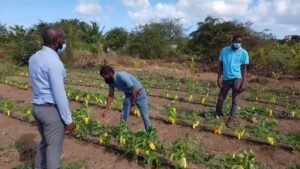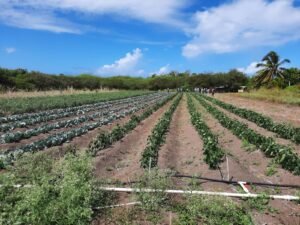Agricultural Education in Belize: Nurturing Sustainable Development and Food Security.Belize, a small Central American country known for its stunning landscapes and rich biodiversity, has a strong agricultural tradition that plays a crucial role in its economy and food security. To ensure the sustainable development of its agricultural sector, Belize has placed great importance on agricultural education and training. This article explores the history, current state, challenges, and future prospects of agricultural education in Belize, highlighting its significance in supporting rural communities, preserving natural resources, and achieving food sovereignty.
Agricultural Education in Belize: Nurturing Sustainable Development and Food Security
Historical Context of Agricultural Education
Agriculture has been the backbone of Belize’s economy since pre-colonial times when the Mayans cultivated crops such as maize, beans, and squash. During the British colonial era, agriculture remained a dominant sector, with a focus on the production of sugar, bananas, and citrus fruits for export. However, the agricultural practices of this period were often exploitative and unsustainable, leading to environmental degradation and social inequality.
In the post-independence era, Belize recognized the need to modernize its agricultural sector and enhance the skills of its workforce to address emerging challenges. Thus, agricultural education became a central component of the country’s development strategy.

The Role of Agricultural Education Institutions
Belize has made significant investments in agricultural education institutions that impart knowledge and skills to farmers, agricultural professionals, and students. Some key institutions include:
- University of Belize: The Faculty of Agriculture at the University of Belize offers undergraduate and graduate programs in various agricultural disciplines, including agronomy, animal science, and agribusiness.
- Central Farm Agricultural Station: Operated by the Ministry of Agriculture, this institution provides practical training, research facilities, and extension services to farmers and students.
- Toledo Community College: Located in the southern district of Toledo, this college focuses on sustainable agriculture and rural development, empowering students to address local agricultural challenges.
- Vocational Training Institutes: These institutes offer technical and vocational training in agricultural skills, supporting the development of a skilled workforce in the agricultural sector.
Agricultural Curriculum and Programs
The agricultural curriculum in Belize is designed to equip students with a comprehensive understanding of sustainable agricultural practices, environmental conservation, and the latest agricultural technologies. The programs aim to strike a balance between traditional knowledge and modern innovations to address the unique challenges faced by Belizean farmers.

The curricula cover a range of topics, including crop and livestock management, agribusiness, soil and water conservation, climate-smart agriculture, pest management, and marketing. Emphasis is also placed on community engagement, encouraging students to collaborate with farmers and local communities to develop practical solutions to agricultural issues.
Challenges and Opportunities
Despite its importance, agricultural education in Belize faces various challenges:
- Limited Access to Education: Access to quality agricultural education remains limited, particularly in rural areas with limited infrastructure and resources.
- Brain Drain: The migration of skilled agricultural professionals to urban areas or other countries can lead to a shortage of qualified personnel in the agricultural sector.
- Climate Change Impact: Belize is highly vulnerable to the impacts of climate change, including extreme weather events and sea-level rise. Agricultural education needs to address climate change adaptation and resilience to build sustainable agriculture.
- Diversity of Agriculture: Belize’s diverse agricultural practices, ranging from traditional subsistence farming to large-scale commercial production, require a flexible education system to cater to different needs.
- Financing and Resource Constraints: Adequate funding and resources are essential for maintaining and expanding agricultural education institutions and programs.
However, these challenges also present opportunities for innovation and improvement:
- Integrated Curriculum: An integrated and multidisciplinary curriculum that combines traditional agricultural knowledge with modern practices can foster holistic and sustainable approaches to farming.
- Community Engagement: Strengthening ties between educational institutions and local communities can enhance knowledge sharing and facilitate research on real-world agricultural challenges.
- Technology Integration: Embracing agricultural technologies, such as precision farming, data analytics, and remote sensing, can enhance productivity and efficiency in the sector.
- Sustainable Practices: Prioritizing sustainable practices in agricultural education can contribute to the conservation of Belize’s rich biodiversity and natural resources.
Agricultural Extension Services
Agricultural extension services play a vital role in supporting agricultural education by bridging the gap between research institutions and farmers. Extension officers serve as intermediaries, disseminating knowledge, best practices, and new technologies to farming communities.
In Belize, the Ministry of Agriculture and various non-governmental organizations operate extension services, providing farmers with training, advisory services, and access to improved inputs. Extension officers also conduct workshops, field demonstrations, and farmer field schools to promote sustainable farming techniques and innovation.

The Way Forward: Strengthening Agricultural Education
To ensure the continued growth and sustainability of the agricultural sector in Belize, several measures can be taken:
- Enhancing Access to Education: Efforts should be made to expand access to agricultural education in rural areas and marginalized communities.
- Encouraging Research and Innovation: Increased investment in agricultural research and innovation can drive the development of new technologies and practices tailored to Belize’s unique context.
- Promoting Public-Private Partnerships: Collaboration between public institutions, private enterprises, and civil society can foster knowledge exchange, capacity building, and investment in the agricultural sector.
- Emphasizing Sustainability: Sustainable agricultural practices should be at the core of agricultural education to ensure the conservation of natural resources and environmental resilience.
- Supporting Smallholders: Specialized training and financial support can empower smallholder farmers to adopt modern practices and improve their productivity.
Conclusion
Agricultural education plays a pivotal role in shaping the future of Belize’s agricultural sector. By imparting knowledge and skills, fostering innovation, and promoting sustainable practices, agricultural education can contribute to the development of a resilient, productive, and equitable agricultural system. As Belize continues its journey towards sustainable development and food security, investment in agricultural education will remain a critical cornerstone of its success.
See more:
